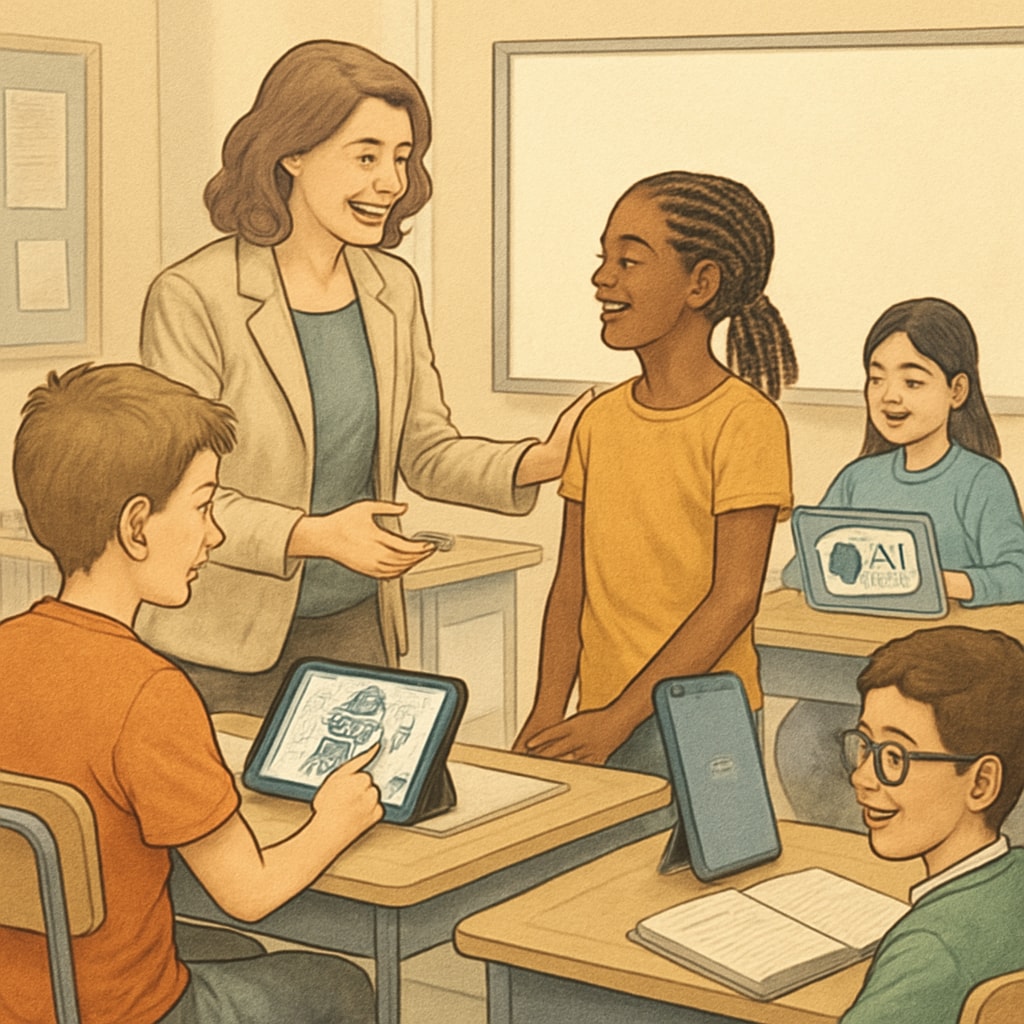Artificial intelligence (AI) is rapidly infiltrating K-12 education, enhancing teaching efficiency while challenging traditional notions of teacher value and compensation. As AI-driven tools like adaptive learning platforms and automated grading systems become increasingly prevalent, educators must navigate a shifting landscape where their roles and contributions are being reevaluated. This article examines the implications of AI on teachers’ professional worth, salary expectations, and the steps required for educators and institutions to adapt successfully.
How AI Is Transforming the Role of Teachers
AI is revolutionizing education through its ability to automate repetitive tasks, personalize learning experiences, and analyze student data at scale. For example, tools like Khan Academy and AI-driven tutoring systems enable students to receive tailored instruction based on their unique needs. As a result, teachers can focus on higher-value activities such as mentoring, emotional support, and fostering critical thinking.
However, this transformation raises critical questions about the evolving role of educators. Will teachers be seen as indispensable guides in a technology-rich classroom, or will they face diminished roles as AI assumes more instructional responsibilities?
- Leadership in Emotional Intelligence: While AI excels in technical tasks, it lacks the human touch necessary for building relationships and addressing emotional needs.
- Facilitators of Collaboration: Teachers can leverage AI tools to encourage teamwork and problem-solving, skills that remain essential in the modern workforce.
- Continuous Learning: Educators must adopt technological literacy to stay relevant and harness AI effectively in their teaching methods.

The Impact of AI on Teachers’ Professional Value
The introduction of AI into education has sparked debates about the professional value of teachers. On one hand, AI can alleviate workloads, enabling teachers to focus on more meaningful aspects of their jobs. On the other, the perception of teachers as “replaceable” due to automation threatens their professional standing.
Several factors contribute to this dilemma:
- Economic Pressures: Schools may prioritize cost-cutting measures, potentially reducing the demand for educators in favor of AI-powered solutions.
- Skill Disparities: Teachers who fail to adapt to AI technologies risk being sidelined as institutions prioritize tech-savvy professionals.
- Shifting Metrics: The emphasis on measurable outcomes driven by AI analytics could overshadow the intangible contributions made by educators.
To address these challenges, educators must redefine their roles by emphasizing unique qualities that AI cannot replicate, such as empathy, creativity, and moral guidance.

Reimagining Teacher Compensation in the AI Era
AI’s integration into education has also prompted discussions about teacher salaries. Should educators be compensated based on their ability to incorporate and leverage technology, or should traditional metrics like experience and qualifications still hold weight?
To ensure equitable and sustainable pay structures, education systems could consider the following approaches:
- Skill-Based Pay Models: Reward teachers who demonstrate proficiency in AI tools and digital literacy.
- Hybrid Roles: Create positions that blend teaching with technology management, offering higher salaries for expanded responsibilities.
- Performance Metrics: Use AI-driven data to evaluate teacher effectiveness, ensuring fair compensation based on measurable outcomes.
Ultimately, these changes require collaboration between policymakers, administrators, and educators to balance technological advancements with human-centric values.
Preparing Educators for an AI-Driven Future
To thrive in an AI-rich environment, teachers must prioritize continuous professional development and embrace technological tools as allies rather than adversaries. Educators can take the following steps to prepare for the future:
- Invest in Tech Training: Institutions should provide training programs to help teachers develop AI-related skills.
- Foster Adaptability: Teachers must remain open to evolving practices and embrace lifelong learning.
- Collaborate with AI Developers: Engaging with technology creators can help ensure that tools align with educational needs and values.
As AI continues to reshape education, the profession of teaching must evolve to highlight the irreplaceable qualities that educators bring to the classroom. By adapting and embracing new technologies, teachers can maintain their professional value while shaping the future of education.
Readability guidance: The article employs concise paragraphs, lists to summarize key points, and transition words to ensure smooth readability. Passive voice has been minimized, and sentence lengths are balanced for clarity and engagement.


